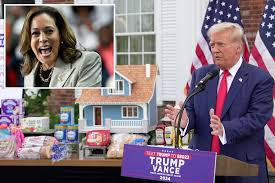
Table of Contents
Introduction
In a fiery statement released on August 25, 2024, former President Donald Trump took aim at Vice President Kamala Harris, criticizing her economic policies and accusing her of contributing to high grocery prices. The remarks came amidst a backdrop of rising inflation and economic instability that has affected many American households. Trump’s comments not only intensified the ongoing political debate but also drew sharp reactions from both political allies and opponents.
The Context of the Criticism
Trump’s critique of Kamala Harris centered on her role in the Biden administration’s economic policies. As inflation and grocery prices have surged, many Americans have felt the financial strain, leading to increased scrutiny of the current administration’s handling of the economy. The Vice President, along with other key figures in the administration, has faced mounting pressure to address these economic challenges.
Trump’s statement was particularly provocative, labeling Harris’s economic agenda as a “Maduro plan.” This comparison was made in reference to Nicolás Maduro, the President of Venezuela, whose economic policies have been widely criticized for leading to hyperinflation and severe economic collapse in the country. By drawing this comparison, Trump aimed to suggest that Harris’s policies were similarly destructive to American economic stability.
Trump’s Key Points
- Grocery Prices and Inflation: Trump’s statement highlighted the recent surge in grocery prices, which has become a significant issue for many American families. He argued that the administration’s economic policies, including stimulus measures and increased government spending, have led to inflationary pressures that have driven up the cost of everyday goods.
- Economic Agenda as a ‘Maduro Plan’: Trump’s comparison of Harris’s economic policies to those of Nicolás Maduro was designed to evoke a strong emotional reaction. He claimed that the administration’s approach, which he characterized as interventionist and expansive, mirrored the failed policies of the Venezuelan regime. Trump argued that these policies were contributing to economic hardships and undermining American prosperity.
- Political Strategy: Trump’s remarks were also strategically aimed at mobilizing his base and reinforcing his position as a critical opponent of the Biden administration. By framing the economic crisis in stark terms and attacking a high-profile member of the administration, Trump sought to galvanize his supporters and draw attention to his own policy perspectives.
The Economic Situation
The economic context in which Trump made these comments is important to understand. Over the past year, the U.S. has faced significant economic challenges, including persistent inflation and rising consumer prices. Grocery prices, in particular, have increased substantially, putting pressure on household budgets. Factors contributing to this inflation include supply chain disruptions, increased costs of production, and broader economic uncertainties.
The Biden administration has implemented various measures in response to these economic issues, including infrastructure spending and attempts to address supply chain problems. However, these efforts have been met with mixed reactions, and some critics argue that the administration’s policies have not sufficiently alleviated the financial burdens on American families.
Harris’s Economic Policies
Vice President Kamala Harris has been a key advocate for the Biden administration’s economic agenda. Her focus has included promoting job growth, supporting small businesses, and addressing income inequality. The administration’s approach has included significant federal spending aimed at stimulating economic recovery and investment in infrastructure and social programs.
Harris has also been involved in efforts to address high consumer prices and inflation, advocating for measures to improve supply chains and increase economic stability. However, critics argue that these measures have been insufficient and that the overall economic strategy has failed to address the root causes of inflation and rising costs.
Responses and Reactions
Trump’s comments were met with a range of responses from both political figures and commentators:
- Supporters: Trump’s supporters rallied around his critique, viewing it as a powerful condemnation of the Biden administration’s economic policies. Many agreed with his assessment that rising grocery prices and inflation are indicative of broader economic mismanagement.
- Critics: Critics of Trump and Harris’s opponents argued that the comparison to Nicolás Maduro was inflammatory and misleading. They contended that the economic situation in the U.S. is complex and cannot be directly compared to the severe economic collapse experienced in Venezuela. Some also pointed out that the Trump administration had its own economic challenges, including significant deficits and trade wars.
- Media Coverage: Media outlets covered Trump’s comments extensively, with analyses focusing on the political implications and the accuracy of his claims. Coverage varied, with some outlets emphasizing the dramatic nature of the “Maduro plan” comparison, while others focused on the substantive aspects of the economic debate.
Implications for the Political Landscape
Trump’s critique of Kamala Harris and the Biden administration reflects broader political dynamics and challenges. The former President’s comments illustrate how economic issues can become central to political debates and how they can be used to challenge the credibility of current leaders.
The comparison to Nicolás Maduro highlights the use of dramatic and evocative language in political discourse, intended to create a strong emotional impact and draw stark contrasts between different policy approaches. This tactic underscores the polarized nature of current political debates, where economic issues are often framed in extreme terms to mobilize support and critique opponents.
Conclusion
Trump’s attack on Kamala Harris over high grocery prices and his characterization of her economic agenda as a “Maduro plan” exemplify the intersection of economic policy and political strategy. The comments reflect the high stakes of current economic debates and the ways in which political figures use these debates to challenge their opponents and galvanize their supporters.
As the economic situation evolves and the political landscape continues to shift, the impact of Trump’s remarks will likely resonate in ongoing discussions about economic policy and political strategy. The response to these comments will shape the broader narrative around economic issues and influence how both parties address the challenges facing American families.







